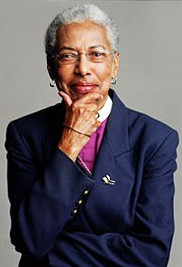
Barbara Clementine Harris
Barbara Clementine Harris made history in 1989 when she became the first woman bishop in the Worldwide Anglican Communion. She was consecrated Suffragan Bishop of the Episcopal Diocese of Massachusetts on February 11, 1989
. As the first woman bishop and an African-American, she received death threats and obscene messages. Though urged to wear a bullet-proof vest to her ordination, she refused. A contingent of the Boston police were assigned to her consecration. Her comment was merely, “I don’t take this in a personal way.”
Harris was born on June 12, 1930 in Philadelphia, Pennsylvania. As a youth, she attended Saint Barnabas Episcopal Church in Philadelphia and developed a strong relationship with her church and its vision. As a young African American woman, she was active in civil rights issues, participating in freedom rides, voter registration efforts, and marches in the 1960s, including the march from Selma to Montgomery, Alabama, led by the Reverend Martin Luther King, Jr. Harris spent summer vacations registering black voters in Greensville, Mississippi. She dismissed the risks she took, saying only, “Everyone was in danger.”
Earlier in her career, Harris worked as a chief public relations executive at the Sun Oil Company, but always held her interests in the Episcopal Church, religion, and in the struggle for justice. Her voice increased in the church in 1974 when she lent her support to a group of Episcopal bishops who defied a ban on ordaining women as priests. Harris served as an acolyte in the service in which the first eleven women were ordained priests in the Episcopal Church on July 29, 1974. She became so engulfed in the issue of women’s rights in the church that she contemplated becoming a priest herself. Her rector at the Church of the Advocate on the north side of Philadelphia, the Rev. Paul Washington, became convinced of Harris’s serious interest in seeking holy orders and recommended her to Bishop Lyman C. Ogilby of Pennsylvania, who ordained her as a deacon in 1979 and a priest in 1980.
She was the priest-in-charge of St. Augustine of Hippo Church in Norristown, Pennsylvania from 1980–1984, served as chaplain to the Philadelphia County prisons, and also as counsel to industrial corporations for public policy issues and social concerns. She was named executive director of the Episcopal Church Publishing Company in 1984, and publisher of The Witness magazine.
Her election in September 1988 to be the Episcopal bishop for the state of Massachusetts occasioned great celebration as well as turmoil. She defeated many prominent candidates, including other female priests, in order to achieve her status. In response to her victory, counter-protests were launched. Several conservative priests revolted, some breaking ties with the church completely, while top Anglican leaders, such as Robert Runcie, the archbishop of Canterbury, refused to acknowledge female bishops in England.
Speaking of her work as bishop, Harris said, “I certainly don’t want to be one of the boys. I want to offer my peculiar gifts as a black woman…a sensitivity and an awareness that comes out of more than a passing acquaintance with oppression.â€�
Harris retired from this position in Boston in 2003. She was succeeded as Bishop Suffragan by another African American woman, Gayle Elizabeth Harris. Harris served as Assisting Bishop in the Episcopal Diocese of Washington, DC until 2007.